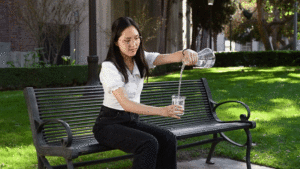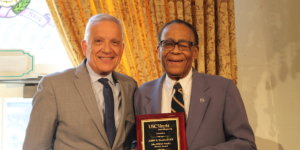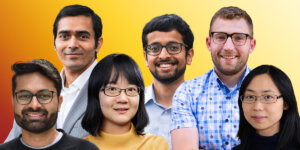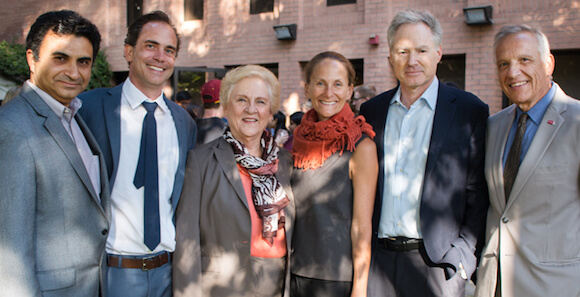
(Left to right) Milind Tambe, Eric Rice, Marilyn Flynn, Heather Carmichael, Eric Horvitz and USC Viterbi Dean Yannis Yortsos
A typical nightmare scenario goes something like this: robots first replace autoworkers on the assembly line. Then they move into white-collar jobs, writing articles, drafting legal documents and reading X-rays. Finally, the robots, growing ever smarter through machine learning and Big Data, displace even the most highly trained workers. The result: unemployment rates skyrocket and the economy craters.
Another scenario: Robots become so intelligent that they not only can beat people in chess and on “Jeopardy,” but they also think faster, better and more analytically than any of us. In time, robots subjugate humanity.
Milind Tambe thinks these dystopian visions, so popular these days, miss the mark. Instead, the Helen N. and Emmett H. Jones Professor at the USC Viterbi School of Engineering believes that the artificial intelligence undergirding the rise of the robots has far more potential for good than for evil.
To advance artificial intelligence research, Tambe and Professor Eric Rice of the USC Suzanne Dworak-Peck School of Social Work have joined forces to co-direct the Center on Artificial Intelligence for Society, or CAIS. At the center, one of the first such university-based institutes dedicated to studying AI as a force for good, researchers will leverage artificial intelligence to address myriad problems ranging from climate change to security to health to homelessness.
On Wednesday, Oct. 5, CAIS was officially launched before an enthusiastic crowd of about 80 friends and supporters in the Vineyard Room at Davidson Conference Center. Those on hand for the celebration included USC Provost Michael Quick; USC Viterbi Dean Yannis Yortsos; Dean Marilyn Flynn, dean of the USC Dworak-Peck School; USC Trustee Suzanne Dworak-Peck, whose $60-million gift just named the social work school; Eric Horvitz, managing director of Microsoft Research; and Heather Carmichael, executive director of My Friend’s Place, a homeless advocacy group.
“CAIS brings together two highly ranked professional schools in social work and engineering, respectively, and is likely the first one of its kind,” USC Viterbi Dean Yortsos said. “It also underlies the important strength that USC has in addressing significant problems through the convergence of disciplines, where engineering plays a key enabling role.”
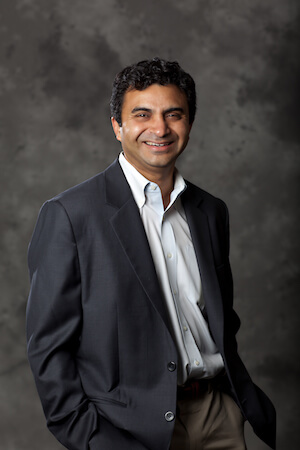
Milind Tambe has conducted AI research for more than 30 years. (Photo: Courtesy Milind Tambe)
AI has continued its significant advancements in the past several years, and now there is greater potential than ever to apply computational game theory, machine learning, automated planning and multi-agent reasoning techniques to problems that are socially relevant,” Tambe said. “There is a very important opportunity here to really harness AI for social good.”
Added Rice: “Wicked social problems such as homelessness are incredibly complicated. AI provides us the opportunity to address them in new ways and yet provide concrete strategies for tackling these problems.”
CAIS will receive initial seed funding from USC Viterbi, USC Social Work and the Office of the Provost as well as grants from federal and state governmental agencies. It will reside on the USC campus, although a permanent home has yet to be found. In addition to interdisciplinary research, the center will also feature conferences and guest lecturers.
A partnership between USC Viterbi and USC Social Work, the AI Center will launch with seven scholars from the two schools, with additional researchers expected to join later.
The USC Viterbi team includes Tambe; Phebe Vayanos, assistant professor in the Daniel J. Epstein Department of Industrial and Systems Engineering; Professor Gaurav Sukhatme, chair of the Department of Computer Science; and Kristina Lerman, project leader at the USC Information Sciences Institute and research associate professor in the Department of Computer Science. Representing USC Dworak-Peck are Rice; Associate Professor Shinyi Wu; and Lawrence Palinkas, the Frances L. and Albert G. Feldman Professor of Social Policy and Health and chair of the Department of Children, Youth and Families.
Center co-directors Tambe and Rice have already showed how to leverage AI for social good.
The pair has teamed up with Los Angeles social workers at Safe Place for Youth to help prevent the spread of HIV among homeless youth. Tambe and other USC Viterbi computer scientists have created an algorithm to identify the most influential young people who can encourage their homeless friends to have AIDS tests. The algorithm becomes more effective as it leverages any new information gained about friendships during the intervention. Preliminary results have proven positive, Tambe said.
Tambe, who has conducted artificial intelligence research for more than 30 years, has won recognition for his AI for social good work. He and his researchers have created algorithms that intelligently randomize schedules of park rangers to combat poaching in Africa and Asia. They have employed similar AI technologies to improve security at Los Angeles International Airport, to better protect the Port of New York and to optimally deploy Federal Air Marshals to prevent airplane terror.
In recognition of his contributions to the field, Tambe was asked this summer to lead a White House Office of Science and Technology Policy-sponsored workshop on “AI for social good” this June in Washington D.C. Early next year, Tambe will head a panel on the same subject at the 2017 Conference of the Association for the Advancement of Artificial Intelligence in San Francisco.
What perhaps animates Tambe most, though, is the new center.
“This is extremely exciting,” he said. “This is not only a fantastic way to advance the state of research in AI, but it will also allow us to solve these wicked social problems.”
Published on October 13th, 2016
Last updated on February 9th, 2021





